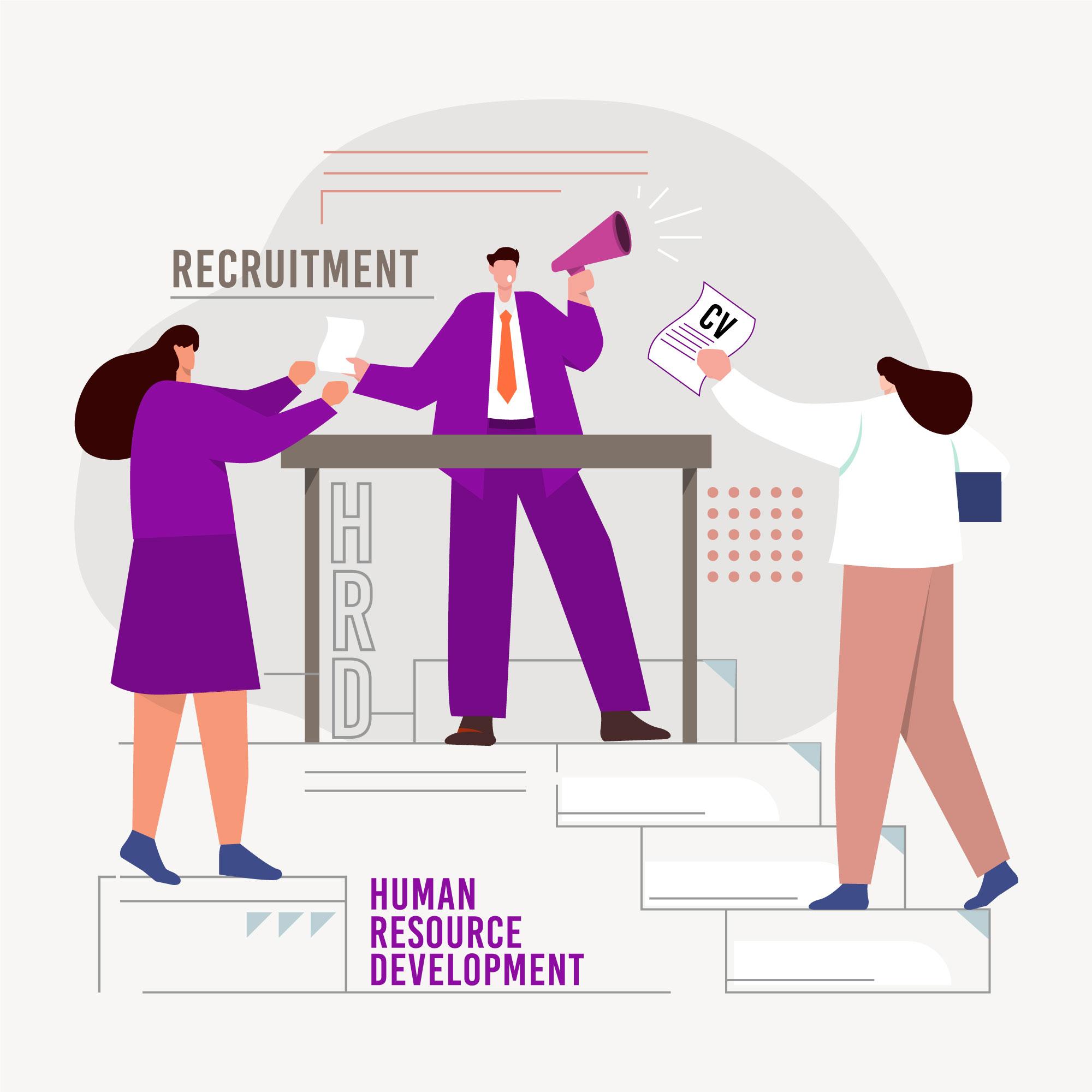Human Resources (HR) teams are the behind-the-scenes heroes, helping companies find, keep, and support their employees. If you’re on the hunt for searching for roles and responsibilities in HR, you have come to the right page. Understanding these roles and responsibilities will help you land great HR jobs.
HR professionals have lots of jobs, like finding the right people for job openings and making sure everyone is happy and productive at work. They’re involved in everything from welcoming new employees and training them. They are also responsible for sorting out pay, evaluating performance, and helping with career growth. This is just a gist, we will discuss the roles and responsibilities of HR in detail ahead.
Who is an HR?
HR, or Human Resources professionals, specialize in handling all aspects related to employee management within an organization. As custodians of its workforce, these specialists must attract, retain, develop, and support employees throughout their tenure in the company. Nowadays, the demand for HR professionals is at its peak. There are tons of jobs available like HR jobs in Mumbai, Bangalore, Delhi, etc.
Roles and Responsibilities of an HR
An HR has multiple tasks to handle, some of which are listed below-
| Header | Roles | Responsibilities |
| Recruitment and Talent Acquisition | Identifying and recruiting top talent. | Creating effective job descriptions. – Conducting structured interviews and assessments. – Overseeing the onboarding process for new hires. |
| Worker Engagement and Relations | Mediating workplace conflicts. | Fostering a positive workplace culture. – Collecting and evaluating employee feedback. – Organizing engagement activities and programs. |
| Compensation and Benefits Administration | Creating and maintaining salary structures. | Managing employee benefit programs. – Conducting compensation analysis. – Ensuring fair compensation based on skills, experience, and performance. |
| Training and Development | Identifying skill gaps and facilitating development. | Developing and implementing training programs. – Hosting workshops and seminars. – Assisting employees with career development. |
| Legal Compliance and Policy Development | Ensuring compliance with labor laws and regulations. | Developing and maintaining HR policies. – Overseeing disciplinary actions fairly. – Promoting diversity and inclusion within the workplace. |
| Performance Management | Designing and implementing performance management systems. | Setting clear expectations.Conducting regular performance reviews. Providing feedback to employees. Identifying areas for improvement and developing individual development plans. |
| Workplace Health and Safety | Developing and enforcing safety policies and procedures. | – Providing safety training. – Handling workplace injuries or incidents. – Ensuring compliance with health and safety regulations. – Assisting employees in accessing healthcare services. |
| Strategic Planning | – Collaborating with senior management on HR strategies. | – Aligning HR strategies with company goals, such as workforce planning and talent acquisition.- Contributing to succession planning and organizational strategy. |
- Recruitment and Talent Acquisition
One of the main responsibilities of HR professionals is ensuring their organization has the appropriate people in each position, which begins with recruitment and talent acquisition.
- HR teams have become adept at identifying and recruiting top talent. Through job postings and networking events, they use various strategies to cultivate an impressive pool of potential candidates. They recruit the ideal candidates through
- Job Description Creation- HR professionals use job descriptions as an effective recruitment tool, outlining roles and qualifications necessary for open positions. Such descriptions help attract the ideal candidates.
- Conducting Interviews- HR leaders utilize structured interview techniques and assessment tools to conduct interviews to assess candidates’ skills, experiences, and suitability for hire. HR uses this information in making informed hiring decisions.
- After selecting candidates, HR oversees their onboarding. This process provides new hires with all of the information, training, and support they require to become productive members of their organization.
- Worker Engagement and Relations
HR plays a critical role in maintaining positive and productive workplace relationships.
- Conflict Resolution: HR serves as a mediator in workplace conflicts, encouraging open dialogue and working toward amicable resolution of any disputes to ensure an ideal work environment.
- Workplace Culture: HR professionals play an essential role in creating an encouraging workplace culture. They promote teamwork, diversity, and inclusion to create an inviting place where all employees feel welcome and accepted.
- Employee Feedback: For continuous development and growth, regular feedback from employees is indispensable. HR can collect and evaluate this input to identify areas for growth and improvement.
- Employee Engagement: HR is responsible for organizing activities and programs designed to build employee morale and engagement, such as team-building exercises, wellness initiatives, and recognition events.
3. Compensation and Benefits Administration
Human resources (HR) plays a pivotal role in overseeing employee compensation and benefits packages.
- Salary Structures: HR professionals create and maintain salary structures that align with industry standards and company objectives, to ensure compensation is fair and competitive.
- Benefits Administration: Human resources professionals manage employee benefit programs such as health insurance, retirement accounts, and other perks for their employees, helping them understand and utilize these benefits to their fullest extent.
- Compensation Analysis: Human resources professionals utilize compensation analysis to ensure that the company’s pay scales remain competitive within their industry and that key talent is attracted and retained effectively. Benchmarking can help ensure this.
- Fair Compensation: HR has an important responsibility to ensure that compensation is equitable and takes into account factors like skills, experience, and performance when setting salaries.
4. Training and Development
HR is accountable for identifying skills gaps within an organization and encouraging employee development.
- HR’s primary task in identifying skill gaps for employees involves evaluations and feedback sessions.
- HR is responsible for making sure their company remains competitive by highlighting any areas where employees must enhance their abilities through evaluations or feedback sessions through:
- Training Programs: HR develops and implements training programs tailored to address skill gaps identified among employees to expand their skills and knowledge base.
- Skill Enhancement: HR hosts workshops, seminars, and online courses to hone employee skills. They keep an eye on progress and adjust accordingly if necessary.
- Career Development: Human resources provide employees with assistance in setting career goals, offering guidance for advancement within the company, and creating growth opportunities.
5. Legal Compliance and Policy Development
Compliance with labor laws and regulations and the creation of HR policies are vital HR functions.
- Legal Compliance: HR is responsible for ensuring that the company adheres to labor laws and regulations, mitigating legal risks.
- Policy Development: HR develops, revises, and maintains policies and procedures to meet changing business environments and needs.
- Disciplinary Actions: Human resources is charged with overseeing all disciplinary processes – warnings, investigations, and terminations – with equal fairness and consistency for employees.
- Diversity and Inclusion: HR promotes diversity and inclusion within the workplace by creating programs that foster an inclusive workforce with equal opportunities for all.
6. Performance Management
HR professionals are accountable for designing and implementing performance management software within an organization, including:
- Setting clear expectations, conducting regular performance reviews, and providing feedback to employees.
- HR plays a pivotal role in identifying areas where employees excel as well as areas requiring improvement within employees
- HR also works to develop individual development plans to boost performance that contribute to overall organizational success.
- Performance management consists of not only rewarding outstanding performances with bonuses or other forms of recognition from Human Resources (HR), but also addressing performance issues through coaching, training, or disciplinary measures if necessary.
7. Workplace Health and Safety
Protecting employees in their working environments is a primary HR obligation.
- HR professionals partner with management to develop and enforce safety policies and procedures; provide safety training sessions for employees to prevent accidents; and create an overall culture of safety within an organization.
- Human Resources’ role is crucial in handling workplace injuries or incidents; HR works closely with legal and compliance teams to ensure compliance with occupational health and safety regulations.
- They also assist employees in accessing necessary healthcare services as they return from illness or injury, supporting their return to work as appropriate.
8. Strategic Planning
HR is more than a daily component:
- It plays a strategic role in shaping an organization’s future.
- HR professionals collaborate closely with senior management to align.
- HR strategies with company goals such as workforce planning, talent acquisition, and succession planning.
Future of HR as a Profession
Human Resources (HR) is ever-evolving; it adapts to changes in technology, society, and business. As HR develops in response to new trends and challenges, its future remains exciting and promising. The demand is not only for experienced professionals, the market is also observing ample HR Jobs for freshers as well.
1. Technology Integration: HR is becoming more reliant on technology, from automation and artificial intelligence to data analytics. HR professionals will soon use such innovations to streamline tasks like recruitment, employee data management, performance evaluation, and career planning more efficiently – freeing them up for more strategic activities such as talent development or workforce planning.
2. Employee Wellbeing and Mental Health: Future HR will place greater importance on employee wellness and mental health, with organizations acknowledging that happy, healthy employees are more productive. HR will play a leading role in providing wellness programs, and mental health support services, and creating work environments that support work-life balance.
3. Remote Work and Adaptability: The COVID-19 pandemic has increased remote work adoption. HR will remain vigilant to any challenges or opportunities presented by remote and flexible work arrangements, in particular maintaining team cohesion, guaranteeing fair treatment, and creating policies to support remote employees.
4. Data-Driven Decision-Making: Data will become HR’s ultimate weapon in the coming years. HR professionals will tap the power of data analytics to make informed decisions regarding talent acquisition, employee engagement, and performance management. Predictive analytics will also enable HR to spot trends or potential issues before they become significant issues.
5. Upskilling and Reskilling: As industries adapt, employees’ skill sets evolve as well. HR plays an instrumental role in identifying skill gaps and offering training opportunities; helping employees adapt to shifting job requirements while encouraging a culture of continuous learning.
Conclusion
HR is the engine of every successful company. HR sets company culture, ensures employees are happy in their jobs and increases engagement across the organization. A company’s success rests upon its people, and HR is there to care for those individuals that make up our organization. HR plays a pivotal role in keeping things running smoothly!
For more valuable information visit our website.





